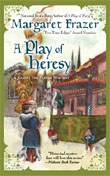CHAPTER 7
The players were readying to bed when Joliffe came up the stairs. Someone – probably Rose – had already laid out his pallet, pillow, and blanket. Basset asked how the practice had gone with Sendell and all.
“Not so bad as he feared,” Joliffe said. “He has some players who will do.”
“But then there’s you,” Ellis said.
Making show of ignoring that, Joliffe went on…
A number of records survive from Coventry, including accounts of the expenses for various guilds in various years. From 1450, the craft guild of Smiths’ accounts include:
| To paint the pageant [wagon] | 4 d. [pence] |
| Item: spent on the players at the last rehearsal | 16 d. |
| Item: spent at bringing down the pageant... | 6 d. |
| Item: paid the torchbearers | 8 d. |
| Item: spent on ale for them | 1 d. |
| Item: paid for ale for the players in the pageant | 12 d. |
Accounts in other years have such things as:
| Item: to a painter for painting the fauchon and Herod's face | 10 d. |
| Paid for painting and dressing Herod's stuff | 2 d. |
| Item: paid for mending of Herod's gown given to a tailor | 8 d. |
The mending of Herod’s gown is probably explained by the fact that the actor playing Herod was generally expected to fling himself about as he ranted and raged, a tradition that held for probably close to two hundred years at least, as evidenced by Shakespeare having Hamlet warn his players not to “out-Herod Herod.”
We also have a pay scale for 1490, where God is paid 2 s. [shillings], Caiphus 3 s. 4d., Herod 3s. 4d., Pilate’s wife 2s., two devils and Judas 18 d., Peter and Malkus 16 d., Pilate 4s.
From the Coventry Leet Book, in the accounts kept for the expenses of producing the Weaver’s Play in the year 1542:
| Item: paid for two rehearsals | 2 s. [shillings] |
| Item: paid to [the actor playing] Simeon | 3 s. 4 d. [pence] |
| Item: paid to Joseph | 2 s. 4 d. |
| Item: paid to Mary | 20 d. |
| Item: paid to Jesus | 20 d. |
| Item: paid to Simeon's clerk | 20 d. |
| Item: paid to Ane | 20 d. |
| paid to the 2 Angels | 8 d. |
| paid for driving the pageant [wagon] | 4 s. 2 d. |
| paid for bread and ale that day | 2 s. |
| ... | |
| paid to the singers | 18 d. |
| paid for gloves | 10 d. |
| spend [non sic] between the plays | 8 d. |
| ... | |
| paid for iron work to the pageant | 12 d. |
| paid for making Simeon's mitre | 8 d. |
| paid nails to the pageant | 4 d. |
Or, as those last two items are actually spelled:
| payd for making of Symyons mytor | viij d. |
| payd for naylys to the pagent | iiij d. |
These are all from Records of Early English Drama: Coventry, ed. R.W. Ingram, University of Toronto Press, 1981 – one of a series of marvelous books where scholars, having gone back through local records, from the earliest ones available on into the 1600s, gathering all references to drama and other entertainments. There’s hardly a better way to see the plays from the working side of them – and a delightful way it is, too.
– Margaret
Follow the virtual bookclub for A Play of Heresy on Facebook and Twitter.
















